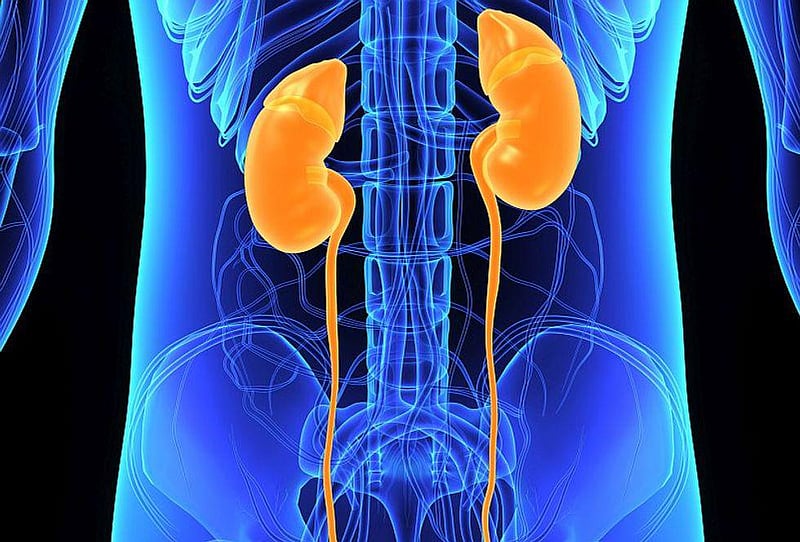Manténgase sano!

- Amy Norton
- Posted September 2, 2021
Kidney Damage Another Consequence of 'Long COVID,' Study Finds
People hospitalized for COVID-19, and even some with milder cases, may suffer lasting damage to their kidneys, new research finds.
The study of more than 1.7 million patients in the U.S. Veterans Affairs system adds to concerns about the lingering effects of COVID -- particularly among people sick enough to need hospitalization.
Researchers found that months after their initial infection, COVID survivors were at increased risk of various types of kidney damage -- from reduced kidney function to advanced kidney failure.
People who'd been most severely ill -- requiring ICU care -- had the highest risk of long-term kidney damage.
Similarly, patients who'd developed acute kidney injury during their COVID hospitalization had higher risks than COVID patients with no apparent kidney problems during their hospital stay.
But what's striking is that those latter patients were not out of the woods, said Dr. F. Perry Wilson, a kidney specialist who was not involved in the study.
They were still about two to five times more likely to develop some degree of kidney dysfunction or disease than VA patients who were not diagnosed with COVID.
"What stood out to me is that across the board, you see these risks even in patients who did not have acute kidney injury when they were hospitalized," said Wilson, an associate professor at Yale School of Medicine in New Haven, Conn.
There is some question about the degree to which the kidney problems are related to COVID specifically, or to being sick in the hospital, according to Wilson. It's unclear, for instance, how their kidney function would compare against that of patients hospitalized for the flu.
But the study found that even VA patients who were sick at home with COVID were at increased risk of kidney problems.
Inflammation to blame?
"There were risks, albeit smaller, among these patients who never had major problems when they were sick," said senior researcher Dr. Ziyad Al-Aly, an assistant professor at Washington University School of Medicine in St. Louis.
Wilson said the "big question" is why?
"Is this reflecting some ongoing immune system stimulation and inflammation?" he said. "It will take more research to figure that out."
The findings -- published Sept. 1 in the Journal of the American Society of Nephrology -- are based on medical records from more than 1.7 million VA patients. Of those, 89,216 were diagnosed with COVID between March 2020 and March 2021, and were still alive 30 days later.
The study looked at patients' risk of developing various types of kidney problems in the months after that 30-day mark.
Overall, COVID patients were more likely to show a substantial drop in the kidneys' glomerular filtration rate (GFR), a measure of how well the organs are filtering waste from the blood.
Just over 5% of COVID patients had a GFR decline of 30% or more, the study found. And compared with the general VA patient population, their risk was 25% higher.
Since adults naturally lose about 1% of their kidney function per year, a 30% decline in GFR is akin to losing 30 years of kidney function, according to Wilson.
The study also examined the risk of acute kidney injury, where the organs suddenly lose function. It can cause symptoms such as swelling in the legs, fatigue and breathing difficulty, but sometimes causes no overt problems.
COVID patients were nearly twice as likely to develop acute kidney injury, though it varied according to initial COVID severity.
Will the damage last?
Those who'd been hospitalized were five to eight times more likely than non-COVID patients to develop acute kidney injury; people who'd been sick at home with COVID had a 30% higher risk, versus the non-COVID group.
It's not yet known what it all means for COVID patients' long-term kidney health, Al-Aly said.
One question now, he noted, is whether the GFR declines in some patients will level off.
As for acute kidney injury, people can recover from it with no lasting harm, Wilson said. And if a drop in GFR is related to acute kidney injury, he noted, it may well rebound.
Some patients in the study did develop end-stage kidney failure. Those odds were greatest among COVID patients who'd been in the ICU: They developed the disease at a rate of about 21 cases per 1,000 patients per year -- making their risk 13 times higher than other VA patients'. Smaller risks were also seen among other COVID patients, hospitalized or not.
A limitation of the study is that the VA patients were mostly older men. It's unclear how the results apply more broadly, according to Al-Aly.
The risks presented to non-hospitalized patients are also somewhat murky. They are far from a uniform group, both doctors said.
Wilson suspects that people only mildly affected by COVID would be unlikely to develop kidney problems, whereas those who are "really knocked out for weeks" might have a relatively greater risk.
The good news, Al-Aly said, is that kidney dysfunction is readily detectable through basic blood work done at primary care visits.
Wilson said that kind of check-up might be worthwhile for people who were more severely ill with COVID.
More information
The National Kidney Foundation has more on COVID-19 and kidney disease.
SOURCES: Ziyad Al-Aly, MD, assistant professor, medicine, Washington University School of Medicine in St. Louis; F. Perry Wilson, MD, associate professor, medicine, Yale School of Medicine, New Haven, Conn.; Journal of the American Society of Nephrology, online, Sept. 1, 2021
